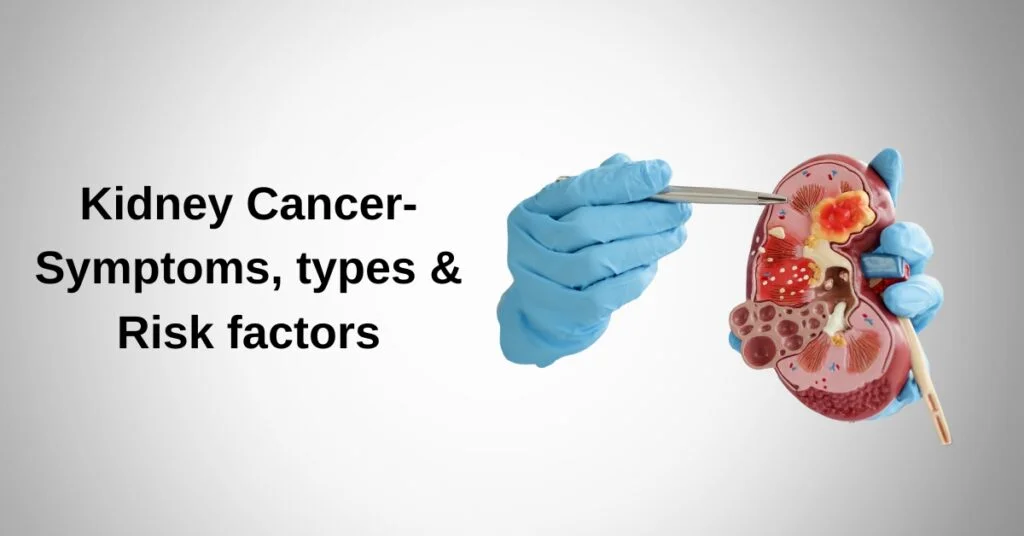Kidney Cancer - Symptoms, Types and Risk factors

What is Kidney Cancer?
In the world of health, kidney cancer is a big concern, but it’s not always easy to understand. It happens when there’s abnormal cell growth in the kidneys, leading to tumors. These tumors can be cancerous or non-cancerous. They can spread if not treated early. We can detect it sooner now with advanced tools like CT scans. Let’s learn more about kidney cancer.
Kidney cancer starts with abnormal cell growth in the kidneys, causing tumors. These tumors can be cancerous (bad) or non-cancerous (not as bad), and they can spread if not treated early.
What are the types of kidney cancer?
- Renal Cell Carcinoma (RCC): This prevalent type constitutes about 90% of kidney cancer cases and mainly affects adults.
- Transitional Cell Carcinoma: Less common, it originates in the renal pelvis, ureters, or bladder.
- Wilms Tumor: Mostly found in children, comprising a small percentage of kidney cancers.
- Renal Sarcoma: Rare, it begins in the connective tissues of the kidney.
What are the stages of kidney cancer?
The prognosis depends on one’s general health, as well as the grade and stage of the kidney cancer. Below mentioned are the stages of kidney cancer. The higher the stage, the more advanced the cancer.
- Stage I: At this stage, the tumor is relatively small, measuring 7 centimeters or less, and it remains localized within the kidney.
- Stage II: The tumor has grown larger than 7 centimeters, but it still hasn’t ventured beyond the confines of the kidney.
- Stage III: This is where things start to get serious. The tumor has infiltrated nearby lymph nodes or blood vessels, or it may have penetrated the fatty tissue surrounding the kidney. However, it hasn’t breached the adrenal gland or surpassed Gerota’s fascia.
- Stage IV: Unfortunately, the cancer has now spread beyond the kidney’s boundaries. It could have invaded neighboring lymph nodes or metastasized to other organs like the bowel, pancreas, or lungs. Additionally, it has broken through Gerota’s fascia, possibly even involving the adrenal gland. Tough times indeed.
What are the symptoms of kidney cancer?
Recognizing the signs of kidney cancer is vital for early detection and treatment:
- Blood in urine (hematuria)
- Persistent back or side pain
- Fatigue
- Unexplained weight loss
- Fever
- Abdominal lump
What are the risk factors of kidney cancer?
Some factors can increase the chances of kidney cancer such as:
- Smoking: Tobacco use, including smoking, is a significant risk factor for kidney cancer, with smokers being at higher risk compared to non-smokers.
- Obesity: Being overweight or obese is associated with an elevated risk of kidney cancer, possibly due to hormonal changes and increased inflammation.
- Family History: Individuals with a family history of kidney cancer, especially among first-degree relatives, have a higher likelihood of developing the disease themselves.
- High Blood Pressure: Hypertension, or high blood pressure, is linked to an increased risk of kidney cancer, although the exact mechanism is not fully understood.
- Workplace Exposure: Exposure to certain chemicals in industries such as mining, welding, and farming may heighten the risk of developing kidney cancer.
Can kidney cancer be prevented?
Reducing the risk of kidney cancer involves comprehensive lifestyle adjustments:
- Quit Smoking: Tobacco cessation is crucial in lowering the risk of kidney cancer, as smoking is a leading risk factor for the disease.
- Maintain Healthy Weight: Following a balanced diet and engaging in regular physical activity can help prevent obesity, a known risk factor for kidney cancer.
- Control High Blood Pressure: Monitoring blood pressure regularly and adopting a healthy lifestyle can help manage hypertension and reduce the risk of kidney cancer.
- Stay Hydrated: Drinking an adequate amount of water daily supports kidney health and may reduce the risk of kidney cancer.
- Limit Exposure to Toxins: Minimizing exposure to environmental toxins and chemicals, especially in the workplace, can lower the risk of developing kidney cancer.
- Eat a Balanced Diet: Consuming a diet rich in fruits, vegetables, and whole grains while limiting processed foods and unhealthy fats can contribute to overall health and reduce cancer risk.
- Stay Active: Regular exercise not only helps maintain a healthy weight but also supports overall well-being, including kidney function, thereby reducing the risk of kidney cancer.
In summary, dealing with kidney cancer is tough, but if we work together to understand it better, we can fight it effectively. By raising awareness, gaining knowledge, and acting quickly, we can lower the chances of getting it and catch it early if it does happen. With advancements in medical science and a commitment to healthier lifestyles, there is optimism for improved outcomes and enhanced quality of life for kidney cancer patients. By fostering awareness and sharing knowledge, we unite in the battle against kidney cancer, paving the way for brighter and healthier tomorrows.
References:
- https://www.webmd.com/cancer/understanding-kidney-cancer
- https://www.cancer.org.au/cancer-information/types-of-cancer/kidney
- https://my.clevelandclinic.org/health/diseases/9409-kidney-cancer
- https://www.sciencedirect.com/topics/
- https://www.mayoclinic.org/diseases-conditions/kidney-cancer
- https://www.cancer.org/cancer/types/kidney-cancer

Dr. A. Venugopal
Clinical Director & HOD, Senior Consultant Medical Oncologist and Hemato Oncologist
About Author
Dr. A. Venugopal
MD (General Medicine), DM (Medical Oncology), MRCP – SCE Medical Oncology (UK), ECMO (Switzerland).
Dr A. Venugopal is One of the best medical oncologist and Hemato Oncologist in hyderabad, currently serving as the Head of the Department and Senior Medical Oncologist, Hemato Oncologist at Pi Health Cancer Hospital in Gachibowli, Hyderabad. He brings over 15 years of extensive experience in the field of Oncology.
